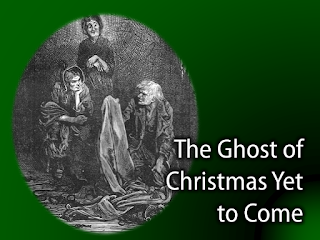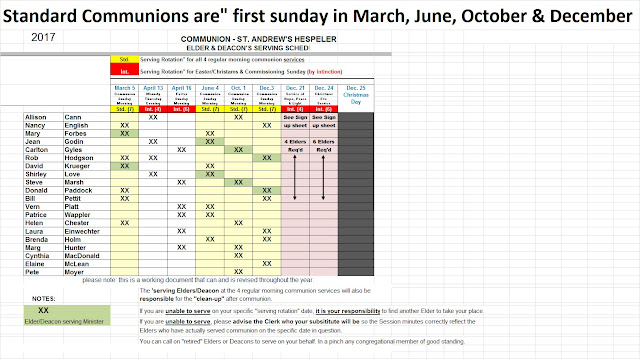Hespeler, 8 January, 2017 © Scott McAndless
Ephesians 4:17-25, Psalm 43, John 8:31-38
| A |
s you may have heard, the Oxford English Dictionary chooses a word of the year for every year that goes by – one word to capture the spirit of the age and mark significant trends in society. You may have also heard that the word that they chose for 2016 was, “post-truth.” They did not choose this word lightly or subjectively. They noted that the use of this word had grown enormously over the last 12 months – appearing 2000 percent more often in articles published over the last year.
The word, they say, is often used in the phrase “post-truth politics’’ and it has to do with the fact that we are living in a time in which truth has become largely irrelevant. The dictionary defines it as an adjective that relates to “circumstances in which objective facts are less influential in shaping public opinion than appeals to emotion and personal belief.”
Of course, the reason why this idea of “post-truth” has become so important is because it has driven events in a powerful way. We saw it in the Brexit campaign in the United Kingdom where the side that was campaigning to see the UK exit the European Union kept going on and on about all of the money that Great Britain was sending away to the European government in Brussels and how that money would be used to improve health services when they won. After the vote was over, they admitted that it that simply a slogan with no actual reality behind it and amazingly it didn’t seem to matter – at least it certainly didn’t change anything.
And then, as we in Canada looked on, the American election rolled out with a post-truth approach taking centre stage. Now, I am not naive. I realize that politicians have been lying and stretching the truth to win elections probably ever since the Greeks first invented democracy. But something unprecedented went on in that vote. As one news organization documented it exhaustively, one of the candidates was saying something that was either partially or completely untrue 70 percent of the time that he opened his mouth. But what was really unprecedented was not necessarily the number of lies but how little they mattered. In fact, you might even make the case that telling the truth was far more likely to get you defeated than telling lies.
But the post-truth reality is not just found in politics. It was actually even more important to journalism. With traditional news media failing all over the place (especially, sadly, in Canada) we saw a powerful new kind of media come on strong as news stories that were blatantly false – that could easily be proved as false with a moment’s research – spread far and wide and were read and largely believed by more people than ever saw much more important legitimate news stories. For example, a story that reported that Pope Francis had endorsed Donald Trump as president was read by millions of people and widely believed even though all you had to do was google the Vatican website to know that it was fake.
The people at Oxford were right, I think, to underline the importance of post-truth as a significant development in our day. Lies are nothing new; they have always existed and they have always been powerful. But we are dealing with something new here – something that will undoubtedly shape our society in significant ways. I am not concerned, at least for the moment, with what this means for the careers of particular politicians. I am more concerned with why it has become so powerful at this particular moment in time.
It doesn’t seem to make sense. We live in an age when people have more information available at their fingertips (literally) than ever before in the history of the world. Never has it been easier for people to do the necessary research to discover the truth or lack of it behind any story, but people seem less inclined to do it than ever. What we have seen is that people are far more likely to connect to and share a story that just feels right to them or that confirms what they have already decided is true about the world. Even more important, a well-established fact or truth that is inconvenient to them or that means that they will have to change their mind or something about their life, they will be very likely to dismiss out of hand.
Truth, it turns out, is simply a lot harder than we all thought that it was. We thought that all you had to do was expose the truth, make it accessible to people and the truth would just prevail from there. Apparently it doesn’t just work like that, at least not anymore.
I decided that I would start out this New Year of 2017 by preaching about the kind of resolutions that we could make that would actually matter. I realize, of course, that New Year’s resolutions have a bad track record. For years millions of people have been making vows on the first of January with the best of intentions that just don’t seem to carry until the end of the month. The impulse is good, but the follow-through just seems to be lacking. But, I thought, what if we worked on changing the underlying attitude rather than just focussing on the outward actions. Maybe that would lead to real and lasting change.
And, given some of the events that have unravelled in politics and media in the past year, it would seem that a dedication to truth is one attitude that we definitely need to be working on. In particular, it would seem that Christians need to be working on it. I would like to be able to say that Christians should be immune to the lures of the post-truth era, but that doesn’t seem to be the case. In fact, it would seem that Christians (in general – I’m sure present company is excepted) have fallen victim to this more often than the general population.
I did my undergraduate studies at the University of Toronto and, over the years, had a number of courses at Victoria College. Every time I would enter into that beautiful old building, I would look up and see the words that were inscribed over the entrance: “The truth shall make you free,” it said. It is, I assumed, at least the unofficial motto of Victoria College. I wonder how many students who have looked at those words over the decades and were inspired by them know where those words come from. It might surprise many of them to know that that inscription is actually quoting Jesus of Nazareth as reported in the Gospel of John. I’ll bet that, if you went to that University campus today and asked the students, many of them would tell you that the last place they would look to find the “truth” would be in religion or the Bible or Christianity. That is, to a certain extent, a result of the general cynicism of our age but part of that is also on us as Christians. Christians have had a certain history (maybe especially in recent years, of being more interested in being right or in getting their way than that are in being committed to the truth no matter what.
But what Jesus says in that passage in John is something that goes to the heart of our faith. Jesus really believed that anything that he came to reveal and represent was not at odds with the fundamental truths of the universe. To embrace the truth was to embrace him, of course, but truth was not exclusive to the revelation in Christ. All truth that might be discovered in this world (even truth that would be discovered in future centuries by the scientific method) was part of that larger idea of truth.
Even more important, Jesus declared that there was a connection between truth and freedom – that those who remained dedicated to truth would remain free while those who didn’t care about it would become slaves. This is a very clear warning and one that we need to take very seriously.
I think that this is something that we see very clearly in what is apparently our modern post-truth reality. Because we are now in an era where people don’t seem to care about the facts behind a report so long as it feels right and reaffirms their previously conceived notions, the population is just that much easier to manipulate so that they act and vote in the ways that the people who are publishing the fake news want. I don’t think that there is any doubt that this kind of manipulation with falsehood did play a role (though it would be hard to quantify how much) in some of the surprising political outcomes in the past year including the Brexit vote, the American election, Italy, Greece, Turkey and a number of other places.
If people were willing to look further than their Facebook feed to figure out whether a story was true or not, the populations would not be so easily manipulated. I wouldn’t say that any of this has yet led us to a place where we are literally enslaved to the whims of powerful masters or that that will necessarily happen, but I will say that I am more concerned that that could happen than I would have been a year ago.
In such a world, I would suggest that one of the resolutions that we as Christian people – as people of faith – should make at the beginning of this New Year is to be committed to what is true. We, the followers of Jesus really ought to be the first to make such a commitment. But what would such a resolution really look like. How would we work it out in practical terms?
Well, first of all, being committed to truth means valuing what is true more than our own comfort. We have all experienced, I am sure, that discomfort and resistance that often comes with being confronted with a truth that we have not heard before or that contradicts what we had previously believed. It is irritating and annoying and it is often just so much easier to simply reject the new information out of hand. I am sure that I have often been guilty of that as have many of you. It is a human reaction, but it is not the reaction of someone who is truly dedicated to the truth. Being such a people means being willing to consider new truths, especially those that come in a convincing way, even if they are uncomfortable or inconvenient and maybe especially when they mean you have to rethink everything that you had always taken for granted. Jesus never promised that the truth would be easy, only that it would set you free.
Being committed to the truth means being willing to use the critical mind that God has given you. I know that sometimes people think that having faith means that you should never have to deal with any doubts or questions. But that is not faith. That is simply certitude – often a foolish certitude because the truth is rarely that simple. In many ways, not having any doubts or questions is the opposite of having faith. Faith is actually about a relationship of trust between you and God and no truly healthy relationship can ever come when you are afraid to entertain questions or doubts. So use that brain that God gave you to ask questions and to seek answers that make sense to you. We ought not to be afraid to engage in such quests for true understanding because God can never be at odds with truth. Questing earnestly for truth can always be a part of your journey towards God.
Being committed to truth also means, Jesus tells us, being committed to freedom. If ever you find yourself being drawn to a story because it just feels right to you, a good question to ask is if this story is leading you closer to freedom or to slavery. Is someone manipulating me with this story? That is always a question worth examining. If they are, chances are that they are not dealing in an entirely truthful way.
It would seem that our world is in desperate need of someone to lead us into a dedication to what is true. My dream is that the Christian church could be a key leader in this journey towards a commitment to truth whatever the cost. To do so would be faithful to the calling and example of Jesus. To do so might just help to change the world in a way that truly matters.











